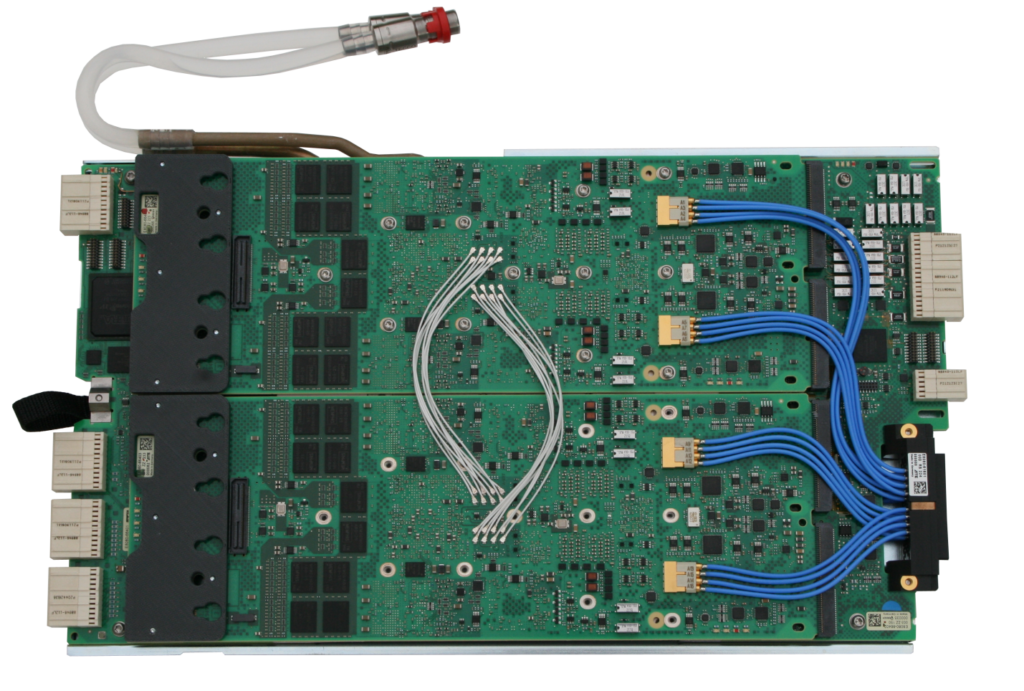Flexible, Massively Parallel RF Device Testing Is Here
By Adrian Kwan, Business Development Manager, Advantest America
Today’s interconnected world provides great conveniences and many opportunities for staying in touch with family, friends and colleagues – not to mention our physical environment and our own health. Our daily lives are replete with smartphones, tablets, cameras, RFID tags, and wearable/sensor-driven devices – all of which require semiconductor ICs to perform to specification. In the wearables category alone, industry estimates project an annual $5-8 billion demand for ICs to supply this market, driven by requirements for low power, connectivity, sensors, and touch and voice interfaces.
All of these devices are connected through a variety of wireless standards: LTE, LTE-Advanced and LTE-A Pro smartphone standards, as well as LTE-M, WLAN, GPS, ZigBee and Bluetooth. This surfeit of standards creates technological complexities, as these wireless technologies – many of which are enabling the Internet of Things (IoT) – have unique requirements and performance criteria that differ depending upon the application. In addition, while 3G/4G LTE technology currently drives the majority of cellular data traffic and covers the most frequencies, 5G is lurking on the horizon and will bring new production challenges.
Devices based on all of these wireless technologies must be fully tested and characterized before they can be brought to market. This makes flexibility and scalability of automated test equipment (ATE) a fundamental requirement. Advantest is answering this demand with new offerings specifically developed to accommodate the testing demands associated with current and emerging RF chips.
Advantest’s Wave Scale™ generation of channel cards for the V93000 “universal pin” test platform represents a paradigm shift in testing RF and mixed-signal devices, delivering unprecedented levels of parallelism and throughput unmatched by other solutions. The V93000 Wave Scale RF and V93000 Wave Scale MX cards substantially reduce the cost of test and time to market for RF semiconductors while creating a path for testing future 5G devices.
![IMG_2574[7]](http://www.gosemiandbeyond.com/wp-content/uploads/2016/07/IMG_25747-e1468893186379.jpg) Current RF testing solutions, which typically require multiple cards plus a separate calibration kit, have employed a fan-out architecture in which subsystem resources are shared. This means that devices with multiple frequency paths are actually tested in serial within the device, rather than in true parallel mission mode testing. It also means that only one RF standard can be tested at a time per site. The V93000 Wave Scale RF condenses four independent RF subsystems into one fully integrated instrument with massive parallelism – as many as 32 ports on each unit, with up 6 units in each system provides the flexibility of up to 192 ports for parallel testing of multiple RF device types. This is enabled via in-site parallelism, in which shared resources are omitted, thus removing the limitations placed on test speedup by other RF test solutions.
Current RF testing solutions, which typically require multiple cards plus a separate calibration kit, have employed a fan-out architecture in which subsystem resources are shared. This means that devices with multiple frequency paths are actually tested in serial within the device, rather than in true parallel mission mode testing. It also means that only one RF standard can be tested at a time per site. The V93000 Wave Scale RF condenses four independent RF subsystems into one fully integrated instrument with massive parallelism – as many as 32 ports on each unit, with up 6 units in each system provides the flexibility of up to 192 ports for parallel testing of multiple RF device types. This is enabled via in-site parallelism, in which shared resources are omitted, thus removing the limitations placed on test speedup by other RF test solutions.
Wave Scale RF and corresponding Wave Scale MX cards can simultaneously test multiple standards or multiple paths within each RF device, achieving both in-site parallelism and high multi-site efficiency. Devices can be tested 2-3x faster than with prior solutions – significantly reducing the cost of test. This is a key requirement for OEMs and fabless semiconductor companies needing to get volume RF-enabled devices to market as quickly as possible.
Both Wave Scale RF and Wave Scale MX feature built-in calibration, and both are water-cooled at the pin electronics level to maintain consistent temperature across all pins. The Wave Scale MX high-speed card is optimized for analog IQ baseband applications and testing of high-speed DACs and ADCs. As with Wave Scale RF, Wave Scale MX omits shared resources, delivering parallel, independent operation of all 32 instruments controlled by a hardware sequencer.
Device integration, market segmentation and performance improvements are the inevitable result of consumer demands for more capability, convenience and mobility. Advantest is leading the way for next-generation RF ATE with its new V93000 Wave Scale solutions, designed to simultaneously support the diverse performance and economic needs of new RF device standards.
Read More
 Figure 1. Advantest HSM16G card for ultra-fast-memory test.
Figure 1. Advantest HSM16G card for ultra-fast-memory test. Continuing Advantest America, Inc.’s commitment to conducting its business in a manner that delivers leading environmental, health and safety performance, AAI is very proud to have entered its 5th year having earned a spot on the U.S. Environmental Protection Agency (EPA) Top 30 Tech & Telecom list, which ranks the country’s largest green power users in this sector. A new web tool from the EPA shows Advantest America (currently 27th) as well as the other Green Power Partners on the list.
Continuing Advantest America, Inc.’s commitment to conducting its business in a manner that delivers leading environmental, health and safety performance, AAI is very proud to have entered its 5th year having earned a spot on the U.S. Environmental Protection Agency (EPA) Top 30 Tech & Telecom list, which ranks the country’s largest green power users in this sector. A new web tool from the EPA shows Advantest America (currently 27th) as well as the other Green Power Partners on the list. Leading industry analyst firm VLSIresearch Inc recently released the results of its annual Customer Satisfaction Survey ranking the 10 BEST Large Suppliers of Chip Making Equipment. For the 28th consecutive year, Advantest was named to the coveted list, achieving the #2 spot and increasing its overall satisfaction rating to 9.12 (out of 10). The company has seen continual improvement in this rating for each of the past six years, and it earned scores of 9 or more in 13 of the 15 categories included in the survey.
Leading industry analyst firm VLSIresearch Inc recently released the results of its annual Customer Satisfaction Survey ranking the 10 BEST Large Suppliers of Chip Making Equipment. For the 28th consecutive year, Advantest was named to the coveted list, achieving the #2 spot and increasing its overall satisfaction rating to 9.12 (out of 10). The company has seen continual improvement in this rating for each of the past six years, and it earned scores of 9 or more in 13 of the 15 categories included in the survey. Advantest marked the 10th anniversary of its VOICE 2016 Developer Conference this year with 129 technical breakout sessions, two Partners’ Expos, 17 technology kiosks and multiple networking opportunities for members of the semiconductor test industry at dual events in San Diego, Calif., on May 10-11, and at Taiwan’s first VOICE conference in Hsinchu on May 18. Altogether, a record high of nearly 600 people attended the events, including 300 industry professionals in Taiwan – the most ever for a VOICE location outside of the United States.
Advantest marked the 10th anniversary of its VOICE 2016 Developer Conference this year with 129 technical breakout sessions, two Partners’ Expos, 17 technology kiosks and multiple networking opportunities for members of the semiconductor test industry at dual events in San Diego, Calif., on May 10-11, and at Taiwan’s first VOICE conference in Hsinchu on May 18. Altogether, a record high of nearly 600 people attended the events, including 300 industry professionals in Taiwan – the most ever for a VOICE location outside of the United States.